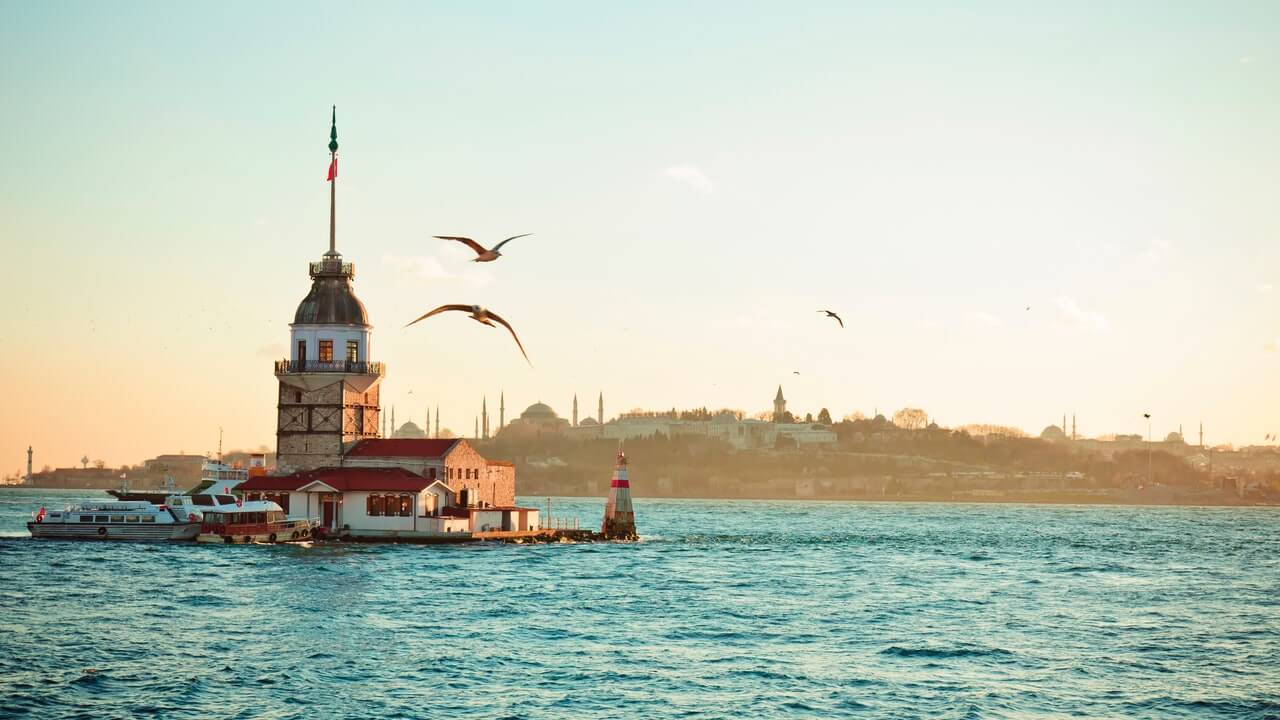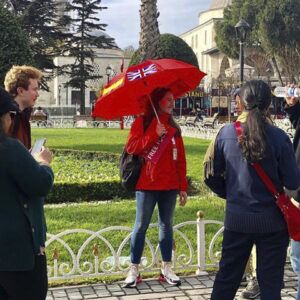Istanbul General Information: Key Facts
Istanbul, with an area of 5,712 square kilometers, is Turkey’s largest city and one of the most expansive cities in Europe. Formerly the capital of the Byzantine and Ottoman Empires, Istanbul is one of the few cities in the world located on two continents, Europe and Asia. This unique geographical distinction is defined by the Bosphorus Strait, which connects the Mediterranean Sea to the Black Sea via the Sea of Marmara, making it a strategic passage for both trade and international navigation.
Over the centuries, the city has played a crucial role in global history, serving as a physical and cultural bridge between East and West. In addition to its strategic position on the Silk Road, Istanbul has been a central hub in railway networks connecting Europe to the Middle East. Although it is no longer the country’s capital (that title has belonged to Ankara since 1923), Istanbul remains the cultural, economic, and social epicenter of Turkey, attracting millions of visitors each year.
A City of Unique Contrasts
With over 15 million residents, according to recent estimates, Istanbul is one of the largest urban centers not only in Europe but worldwide. It is a dynamic, ever-awake city that hosts a diverse population, including a Muslim majority and significant Christian, Jewish, and other religious minorities. Among these groups is the Ecumenical Patriarchate of the Orthodox Church, headquartered in the Fener district.
Istanbul is a city of astonishing contrasts. Its intercontinental character and rich history make it one of the most fascinating cities in the world: ancient yet modern, conservative yet liberal, European yet Asian. On one hand, it boasts stunning landmarks like Hagia Sophia, the Blue Mosque, and the Topkapi Palace. On the other hand, it offers a vibrant modern life with neighborhoods filled with cafes, art galleries, and skyscrapers. The city balances its historical past with constant evolution, serving as an inexhaustible source of inspiration for artists, writers, and travelers.
A Premier Tourist Destination
Istanbul is one of the world’s top tourist destinations. Recognized for its historical and cultural wealth, it was designated a World Heritage Site by UNESCO in 1985, with a special focus on its historic center. Highlights among the heritage sites include:
- The Hagia Sophia, a symbol of Byzantine and Ottoman architecture.
- The Hippodrome, once the heart of Constantinople’s social and political life.
- The Topkapi Palace, residence of Ottoman sultans for centuries.
- The Galata Tower, one of the city’s most iconic landmarks.
In 2010, Istanbul was named a European Capital of Culture, recognizing its role as a melting pot of tradition and modernity. In 2013, the prestigious New York Times included Istanbul among the top ten places to visit. Additionally, its candidacy for the 2020 Olympic Games reflected its ability to blend modern infrastructure with a rich historical heritage.
Unique Geography and Heritage
Istanbul is divided by the Bosphorus Strait, which not only separates the European and Asian continents but also connects the Sea of Marmara to the Black Sea. This strategic strait has been a vital point of control for maritime trade and international transit for centuries. To the west of the Bosphorus lies the Golden Horn, a water inlet that historically served as a natural harbor for trade and defense ships.
Administratively, Istanbul is also the capital of the Province of Istanbul, although its influence extends far beyond. The city combines ancient mosques, Ottoman palaces, and historic bazaars with modern shopping centers and a constantly expanding infrastructure, such as the Istanbul Airport, one of the largest in the world.
Culture and Society
Istanbul’s culture reflects its role as a crossroads of civilizations. From culinary traditions that blend Middle Eastern and European flavors to its vibrant art and music scene, the city offers a unique experience for visitors. Highlights of the cultural calendar include:
- The Istanbul International Film Festival, bringing together filmmakers and cinephiles from around the world.
- The Istanbul Music Festival, featuring classical and contemporary music performances in historic venues.
- Night markets and festivals during Ramadan, offering a chance to experience local life.
Socially, the city is marked by remarkable diversity and a fast-paced rhythm of life. Each neighborhood has its own character, from historic Sultanahmet to the modern and bohemian areas of Kadıköy or Beyoğlu.
Conclusion
Istanbul is not just a city; it is a bridge between cultures, a historic crossroads, and a modern powerhouse. Its rich history, combined with its vibrant modern life, makes it a must-visit destination for any traveler. From the imposing minarets that define its skyline to the bustling streets of its bazaars, Istanbul offers a unique experience that captivates all who visit. It is a place where the past and present coexist in perfect harmony, creating a city that will undoubtedly remain in the memory of those who explore it.



3 thoughts on “Istanbul General Information”
★★★★★
Looking for an authentic and enriching experience? ‘Istanbul General Information’ is the place to be! Absolutely worth the visit.
★★★★★
Highly recommend visiting ‘Istanbul General Information’—a site rich with history and unparalleled beauty.
★★★★★
Exploring ‘Istanbul General Information’ exceeded all my expectations. A perfect combination of culture, beauty, and knowledge.